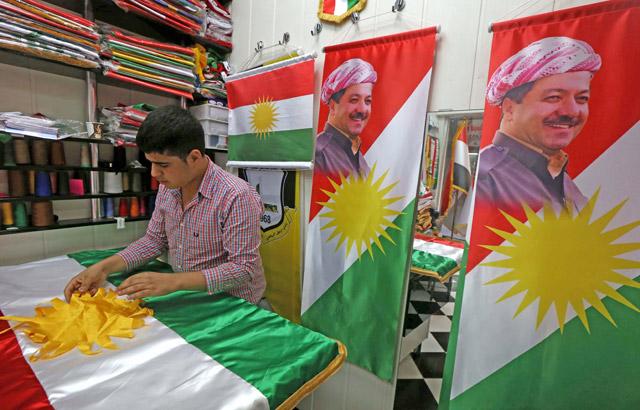You are here
Fleeing Shiite Turkmen caught in Iraq limbo
By AFP - Jul 02,2014 - Last updated at Jul 02,2014
AL KHAZAR, Iraq — Dozens of families who fled a Shiite Turkmen town in northern Iraq overrun by Sunni militants want to move south but are stuck in limbo between the Kurdish authorities and insurgents.
The families said they initially fled Tal Afar, part of a swathe of territory across five provinces which fell to jihadist-led fighters in an offensive that began June 9, for the nearby town of Sinjar.
They then moved to camps on the outskirts of Iraq’s autonomous three-province Kurdish region, they told AFP.
But land routes to the Shiite-dominated south, which is markedly more stable than the conflict-hit north and west, are controlled by militants led by the jihadist Islamic State (IS) group.
And Kurdish authorities have blocked those fleeing the conflict in northern Iraq from entering the autonomous region without a resident sponsor.
They have also barred them from the regional capital Erbil entirely, meaning they cannot get to the airport to fly south.
“When we arrived at the camp, they provided us with food, but we do not want to live in a camp,” said Murtada Qassem, who fled Tal Afar to Sinjar, and then later to a camp bordering the Kurdish region.
“We want to go to the south, to get jobs and better housing,” the father of seven said.
Kadhim Naqi, a 64-year-old with nine children, added that his family wanted to move south because “there is no war or dispute there... It is more stable”.
Around 1.2 million people have been displaced within Iraq by unrest this year, including hundreds of thousands who fled their homes following the militant offensive.
Many have sought refuge in hotels in Kurdistan as tourists, thereby evading the requirement for a local sponsor, but a large number have been prevented from entering the autonomous area because they have not found a resident to support their entry.
As a result, they have been forced to stay in camps near Al Khazar checkpoint, the main entry route from Arab areas of northern Iraq to Erbil.
“The situation is very difficult, and our policy now is to settle those refugees in the camps,” said Dindar Zebari, deputy chief of the Kurdish foreign relations department.
Zebari said those in the camps were free to leave, but without safe overland routes and with air transport inaccessible, they have little option but to stay.
The International Organisation for Migration has urged the establishment of safe routes to provide aid to the needy, amid worries of a worsening humanitarian crisis.
Amnesty International said Tuesday that the Islamic State was specifically targeting the region’s many minorities, which include Turkmen Shiites, Shabaks, Yazidis and Christians.
The London-based rights watchdog said it had “documented a string of abductions carried out by [IS] targeting minority communities”.
Among the worst affected were the Yazidis, a small group chronically referred to by IS militants as “devil-worshippers” for following a unique blend of Islam, Zoroastrianism and other religions.
Related Articles
ERBIL, Iraq — Iraq's autonomous Kurdish region on Wednesday announced it would hold a referendum on independence, in a move the central gove
ERBIL/BAGHDAD — Iraqi Kurdish and Shiite forces agreed to coordinate movements after cutting off Mosul from the rest of the territory held b
SINJAR — Since Iraqi forces pushed the Kurds out of the Yazidis’ mountainous heartland of Sinjar in northern Iraq in October, residents are

















